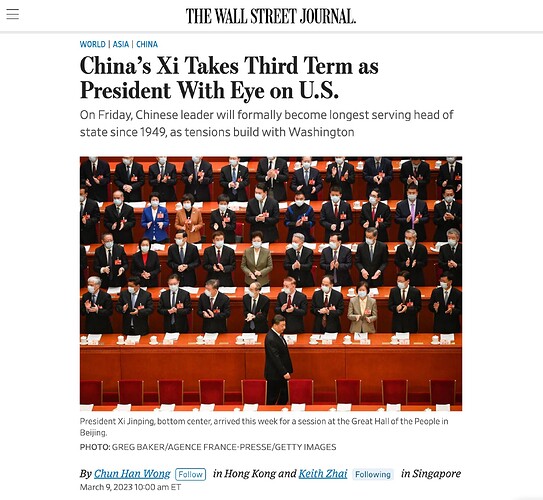-
中国领导人习近平即将获得史无前例的第三个国家元首任期。
-
在他去年秋天第三次担任共产党主席后,他的连任被认为是一种形式。
-
他利用这个主要是仪式性的主席职位,将自己塑造成中国面向世界的形象。
-
熟悉习近平 想法的人说,他对中国和美国之间的关系表达了越来越强烈的悲观情绪。
-
他认为,华盛顿关于两个超级大国之间可能发生冲突的言论最终可能被证明是一个 “自我实现的预言”。
-
本周早些时候,他对美国政策发出了异常直率的斥责,中国外交部长秦刚警告说,如果美国不改变路线,就会发生 “冲突和对抗”。
-
习近平 的大部分权力来自他作为党和军队首脑的角色。
-
他正在寻求重新确立自己作为全球政治家的地位,并驾驭与美国日益激烈的竞争关系。
-
这周五(2023年3月10日),在中国的橡皮图章立法机构正式授予他五年的总统任期后,他将成为中国自1949年共产党胜利以来任职时间最长的国家元首。
-
习近平 可能会寻求通过未来五年的大胆行动来确定他的遗产,这可能涉及到在国内推动有效的党内领导,在外交政策中 “挺身而出”,以及在国际上捍卫中国利益。
-
习近平 今年可能会加强对外旅行,以修复紧张的关系,并准备访问莫斯科和可能的一些欧洲国家。
-
他在第三个任期内面临着艰巨的挑战,特别是美国召集欧洲和亚洲的盟友遏制中国获得关键技术,并就其对莫斯科的持续支持向中国政府施压。
-
中国历史学教授丹尼尔-李Daniel Leese指出,这种做法有很大风险。
-
国务院新闻办公室没有对评论请求作出回应。
-
习近平 可能会寻求通过未来五年的大胆行动来确定他作为一位杰出领导人的遗产。
-
他将试图通过增加对外旅行来修复紧张的关系,同时也要面对来自美国及其盟友的挑战,遏制中国对关键技术的获取。
-
丹尼尔-李斯指出,这种做法有很大的风险。
-
习 一直在为与美国的对抗做准备
-
告诉官员要确保中国的GDP高于美国
-
中国的GDP在2022年似乎比美国增长得多
-
加强中国军队并加速扩大核武库
-
中国官员和外交官需要习近平 的指示才能与美国同行讨论任何重大问题
-
很少有高级官员愿意与美国人微笑相处
-
习近平 本周对美国的评论有助于他转移对国内挑战的注意力
-
除非发生全面的金融危机或其他灾难,否则国内地位似乎很稳固
-
自1982年以来,由于防止一人独大的保障措施,中国国家元首的任期被限制为10年。2018年,习近平主席取消了国家主席的两届任期限制,允许他在10年的周期之外继续任职。此举引起了许多党内人士和普通中国人的担忧,但有人认为,这是他发挥 "集中统一领导 "的需要。
-
从习近平的角度来看,让一个单独的总统挑战他的权威是不太可能的,但并非不可能。自2018年以来,他将权力集中在自己手中,最近还批准了党和国家机构的重组,以进一步巩固党对政策的控制。
-
自七十多年前毛泽东宣布成立人民共和国以来,没有一个中国国家元首的任职时间超过10年。2018年,习近平主席取消了国家主席的两届任期限制,允许他在10年的周期后继续任职。此举使他能够进一步巩固党对政策的控制,并将于周五获得立法机构的批准。
-
中国国家主席习近平正在重申党对国家和社会的主导地位,这可能会导致一个具有毛泽东主义色彩的一人政治制度。
-
蔡奇是党内第五号人物,是成为中央委员会办公厅主任的领跑者,中央委员会办公厅是一个强大的机构,负责处理党的最高领导人的文件流通、日程安排和安全。
-
如果蔡奇成为办公厅主任,他将是自毛泽东时代以来被任命为该职位的最高级别官员。这将标志着重新回到1950年代和1960年代的政治不稳定和政策灾难。
-
Chinese leader Xi Jinping is on the cusp of securing an unprecedented third term as the country’s head of state.
-
His reappointment has been considered a formality after he took a third term as Communist Party chief last fall.
-
He has used the largely ceremonial presidency to cast himself as China’s face to the world.
-
People familiar with Mr. Xi’s thinking say he has expressed a growing sense of pessimism about relations between China and the U.S.
-
He believes that talk in Washington of a potential conflict between the two superpowers may ultimately prove to be a “self-fulfilling prophecy.”
-
Earlier this week, he issued an unusually blunt rebuke of American policy and Chinese Foreign Minister Qin Gang warned of “conflict and confrontation” if the U.S. doesn’t change course.
-
Mr. Xi derives most of his powers from his roles as head of the party and the military.
-
He is seeking to reassert himself as a global statesman and navigate an increasingly fractious rivalry with the U.S.
-
He is set to become China’s longest serving head of state since the Communist victory in 1949 after the country’s rubber-stamp legislature formally vests him with another five years as president on Friday.
-
Mr. Xi may seek to define his legacy through bold action over the next five years, which could involve pushing through effective party leadership domestically, ‘standing tall’ in foreign policy, and defending Chinese interests internationally.
-
Mr. Xi is likely to step up foreign travel this year to repair strained relations and is preparing to visit Moscow and potentially some European countries.
-
He faces daunting challenges in his third term, particularly from the US rallying allies in Europe and Asia to curb Chinese access to critical technologies and press Beijing over its continued support for Moscow.
-
Daniel Leese, a professor of Chinese history, states that this approach carries significant risks.
-
The State Council’s Information Office did not respond to a request for comment.
-
Mr. Xi may seek to define his legacy as an exceptional leader through bold action over the next five years.
-
He will be attempting to repair strained relations through increased foreign travel, while also facing challenges from the US and its allies to curb Chinese access to critical technologies.
-
Daniel Leese notes that this approach carries significant risks.
-
Mr. Xi has been preparing for confrontation with the US
-
Told officials to ensure China’s GDP is higher than US
-
China’s GDP appears to have grown more than US in 2022
-
Beefed up Chinese military and accelerated expansion of nuclear arsenal
-
Chinese officials and diplomats need directive from Mr. Xi to discuss anything significant with US counterparts
-
Few senior officials are willing to smile with Americans
-
Mr. Xi’s comments about US this week help him deflect attention from challenges at home
-
Domestic position appears secure barring a full-blown financial crisis or other catastrophe
-
Since 1982, Chinese head of states have been limited to a 10-year term due to safeguards against one-man rule. In 2018, President Xi Jinping scrapped the two-term limit on the presidency, allowing him to stay in office beyond the 10-year cycle. This move caused concern among many party insiders and ordinary Chinese, but it was argued that it was necessary for him to exert “centralized and unified leadership”.
-
From Mr. Xi’s perspective, having a separate president challenging his authority would be unlikely, but not impossible. Since 2018, he has centralized power in his own hands, and recently approved a restructuring of party and state institutions to further entrench the party’s control over policy.
-
No Chinese head of state has held office longer than 10 years since Mao proclaimed the People’s Republic more than seven decades ago. In 2018, President Xi Jinping scrapped the two-term limit on the presidency, allowing him to stay in office beyond the 10-year cycle. This move has allowed him to further entrench the party’s control over policy and is set to receive legislative approval on Friday.
-
Chinese President Xi Jinping is reasserting the party’s dominance over state and society, which may lead to a one-man political system with Maoist overtones.
-
Cai Qi, No. 5 in the party hierarchy, is a front-runner to become the director of the Central Committee General Office, a powerful organ that handles document flow, scheduling and security for top party leaders.
-
If Mr. Cai becomes General Office director, he would be the highest-ranking official to be appointed to this post since the Mao era. This would signify a return to the political instability and policy disasters of the 1950s and 1960s.
链接:China’s Xi Jinping Takes Third Term as President With Eye on U.S. - WSJ
